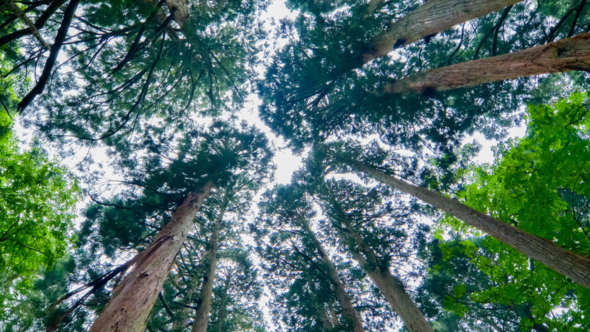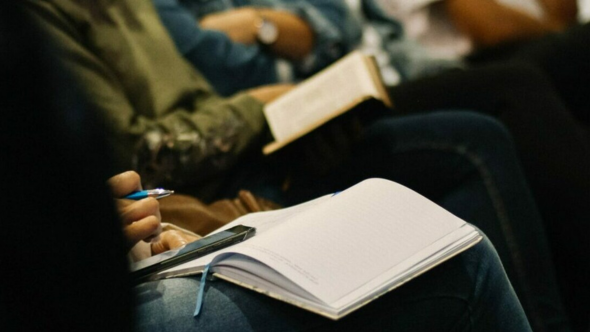Four Years of Commemoration - A Call to Action
The National Day for Truth and Reconciliation was established four years ago to recognize the legacies of the Canadian Residential School System. In that time, what Calls to Action outlined in the Truth and Reconciliation Commission’s report have you honoured? What learning have you done and has any of that turned into knowledge sharing and action?
Please join us this year in honouring the day by attending one of our film screenings and the National Day for Truth and Reconciliation Panel Discussion. You can find more information on the planned events in the Events section on the right.
We invite you to download the National Day for Truth and Reconciliation Zoom background.
Events:

York University Bookstore
We invite everyone to join the journey toward education and reconciliation by purchasing and wearing an orange shirt. The York University Bookstore is a committed partner of the Orange Shirt Society, which will benefit from proceeds from the sale of the orange shirts.
Resources
- Read the Truth and Reconciliation Commission findings (conclusions de la Commission de Vérité et Réconciliation du Canada) and 94 Calls to Action (Appels à l’action).
- Read the National Inquiry into Missing and Murdered Indigenous Women and Girls final report (le rapport final de l’Enquête nationale sur les femmes et les filles autochtones disparues et assassinées), the 231 Calls for Justice (Les appels à la justice) and the 2021 Missing and Murdered Indigenous Women, Girls, and 2SLGBTQQIA+ People National Action Plan: Ending Violence Against Indigenous Women, Girls, and 2SLGBTQQIA+ People that responds to the final report.
- Read the Spirit Bear Plan (Le Plan de Spirit Bear) from the First Nations Child and Family Caring Society.
- Universities Canada Principles on Indigenous Education (Les universités canadiennes principes en matière d’éducation des Autochtones)
- The Assembly of First Nations: It’s Our Time Toolkit
- Orange Shirt Society
- Lighting the Fire: Experiences of Indigenous Faculty in Ontario Universities
- Take a course at York University – there are many that have an Indigenous focus.
- Read the Indigenous Framework for York University: A Guide to Action.
- First Nations University of Canada (FNUniv): Nisitohtamowin ᓂᓯᑐᐦᑕᒧᐃᐧᐣ An Introduction to Understanding Indigenous Perspectives in Canada. In partnership with BMO and Reconciliation Education, FNUniv is bringing this introductory eLearning opportunity to organizations and communities across Canada. The eLearning course is a free public resource for all Canadians and is available June 1 to July 15 in recognition of National Indigenous History Month. It is an hour-long overview.
- University of Alberta course: Indigenous Canada is a 12-lesson massive open online course (MOOC) from the Faculty of Native Studies that explores Indigenous histories and contemporary issues in Canada. From an Indigenous perspective, this course explores key issues facing Indigenous Peoples today from a historical and critical perspective, highlighting national and local Indigenous-settler relations. If you take a course in audit mode, you will be able to see most course materials for free.
- The Indigenous Knowledge Implementation Packsack: A Handbook for Embedding Indigenous Ways of Knowing in Your Teaching – link: https://heqco.ca/pub/the-indigenous-knowledge-implementation-packsack-a-handbook-for-embedding-indigenous-ways-of-knowing-in-your-teaching/
- The description for the FNUC course needs to change – can it read: Nisitohtamowin ᓂᓯᑐᐦᑕᒧᐃᐧᐣ An Introduction to Understanding Indigenous Perspectives in Canada is a course from First Nations University of Canada, with partners BMO and Reconciliation Education and is available free to the public until September 2025.
- Donate to Indigenous scholarships or an Indigenous-led organization.
- Write to elected representatives.
- Attend Indigenous community events with respect and openness.
- Read books, watch films or television programs and view art by Indigenous Peoples.
- Toronto Public Library “Read Indigenous” List
- National Film Board of Canada’s Indigenous Cinema Collection
- Aboriginal Peoples Television Network (APTN)
- Art Gallery of Ontario Indigenous Collection
- CBC Gem Indigenous Stories Collection
- Support is available for survivors and those affected through the Indian Residential Schools Survivors Society at 1-800-721-0066 or on the 24-hour crisis line at 1-866-925-4419. You can also visit their website here.
- York University’s Centre for Sexual Violence Response, Support & Education serves all York community members by empowering survivors and providing access to needed supports. The Centre staff are available 24 hours a day at 416-736-5211
- There are a variety of supports available to the York community listed on the Well-being at York website.
- IRSSS Services: Counselling, therapy, healing, coaching, workshops, traditional healing methods/medicines, etc. https://www.irsss.ca/services
- Hope for Wellness Help Line: 1-855-242-3310 (available 24 hours, in English, French, Cree, Ojibway, Inuktitut)
- Health Canada Help Line: 1-866-925-4419
- Health Canada’s Northern Region: 1-800-464-8106
- NWAC Elder Support Line Canada Wide: (M-F 9am-11am, 1pm-3pm): 888-664-7808

York University Libraries
The York University Libraries team has curated a collection of books you are invited to read as you learn about and reflect on the National Day for Truth and Reconciliation.
Live Streams
2024
National Day for Truth and Reconciliation at York
September 30, 2024
2023
National Day for Truth and Reconciliation Speaker Reflections Panel
September 28, 2023
2022
Reclaiming and Rewriting Indigenous Histories of the Western Hemisphere (the Americas)
September 29, 2022
2022
Reflecting on the Legacies of Residential Schools: What it means for our present and our futures
September 30, 2022
2021
Reflections on the National Day for Truth and Reconciliation
September 30, 2021
Feature Films & Documentaries
2006, 1h28m
Directed by Nadia McLaren Muffins for Granny is a remarkably layered, emotionally complex story of personal and cultural survival. McLaren tells the story of her own grandmother by combining precious home movie fragments with the stories of seven elders dramatically affected by their experiences in residential school. McLaren uses animation with a painterly visual approach to move the audience between the darkness of memory and the reality that these charismatic survivors live in today.
2024, 15min
In Hebron Relocation, Andersen explores what makes a place a home as she speaks with community members about how the relocation impacted generations of Labrador Inuit.
2021, 29min
As the Chair of the Truth and Reconciliation Commission, Senator Murray Sinclair was a key figure in raising global awareness of the atrocities of Canada’s residential school system. With determination, wisdom and kindness, Senator Sinclair remains steadfast in his belief that the path to actual reconciliation between Indigenous and non-Indigenous people requires understanding and accepting often difficult truths about Canada’s past and present. Alanis Obomsawin shares the powerful speech the Senator gave when he accepted the WFM-Canada World Peace Award, interspersing the heartbreaking testimonies of former students imprisoned at residential schools. The honouring of Senator Sinclair reminds us to honour the lives and legacies of the tens of thousands of Indigenous children taken from their homes and cultures, and leaves us with a profound feeling of hope for a better future.
2008, 22min
This short documentary explores the legacy of residential schools through the eyes of two extraordinary women who not only lived it, but who, as adults, made the surprising decision to return to the school that had affected their lives so profoundly. This intimate and moving film affirms their strength and dignity in standing up and making a difference on their own terms.
2023, 27min
Filmmaker and educator Janine Windolph ventures from Saskatchewan to Quebec with her two teens and younger sister, tracing their familial origins to the Cree First Nation of Waswanipi. Against the scenic backdrop of these Traditional Lands, Elders offer newfound interdependence and hands-on learning, transforming this humble visit into a sensory-filled expression of reclamation and resilience. Our Maternal Home lovingly establishes a heart-centred form of resistance to confront and heal from the generational impacts of cultural disconnection, making space for what comes next.
See the full list of films and documentaries by clicking the Watch Now button below.
Note: Passport York is required to access many of the films.
Podcasts: National Day for Truth and Reconciliation
September 2022. 46min.
As we gather for the second National Day for Truth and Reconciliation, we find out where we are on the journey and hear from people walking the reconciliation talk. Each year, the Yellowhead Institute writes a report on how many of the TRC's 94 Calls to Action have been completed. Eva Jewell is the research director at the Yellowhead Institute and co-author of the report. Find out why she says Canada is way behind on the reconciliation journey and why September 30th is more than just another stat holiday. Kayla Littlepoplar is the first ever official Indigenous Youth Leader at BGC Canada (formerly Boys and Girls Club). The teen from Sweetgrass First Nation has been sharing Indigenous culture and language with kids in North Battleford, Saskatchewan. But this new national platform means the 17-year-old leader-in-the-making will reach even more people. And Indigenous people from coast to coast tell us what they'll be doing on September 30th, what the NDTR means to them, and how they think non-Indigenous people can contribute to a better shared future.
2024
An 8-part series that tells the stories of four students: three who survived and one who didn’t. They attended one of Canada’s most notorious residential schools – where unsolved deaths, abuse, and lies haunt the community and the survivors to this day. Hosted by Duncan McCue.
33min
The long overdue conversation around residential schools and historical injustice is finally gaining traction. We head to Maskwacis where the four nations honoured the lives of the 215 children whose remains were found at an unmarked burial site on the grounds of the former Kamloops Indian Residential School. And an Edmonton business owner shares why they're dropping a historically charged name. Plus Edmonton Oilers’ Ethan Bear and his girlfriend Lenasia join us to speak out on racism online and how he's standing up for people of colour off the ice. This episode contains content that may be distressing for some listeners. A National Indian Residential School Crisis Line has been set up to provide support for former students and those affected. Emotional and crisis referral services can be accessed by calling the 24-hour national crisis line: 1-866-925-4419.
2020
“Residential Schools” is a three-part podcast series created by Historica Canada and hosted by Shaneen Robinson-Desjarlais. It aims to commemorate the history and legacy of residential schools, and honour the stories of First Nations, Métis, and Inuit Survivors, their families, and communities.
2023
In this episode, Candace boldly addresses truth before reconciliation, delivering poignant reflections for non-Indigenous listeners. She tackles the subjects of white supremacy, church's role, cultural appropriation, reconciliation with Two-Spirit and IndigiQueer People, media influence, and inherent biases.
2023
In this podcast episode, Candace delves into the significance of Truth and Reconciliation and initiating the process of decolonization. She emphasizes the need for non-Indigenous individuals to engage in self-reflection, learning, and taking actionable steps towards change. Candace also extends a message to Indigenous Peoples, encouraging them to prioritize self and community care while participating in discussions about the intergenerational survival of Residential Schools.
2023
Hosted by Tammy Wolfe, provides listeners with a variety of knowledgeable perspectives on both current and historical context of Indigenous truths throughout Canada, in order to educate, inform and encourage reconciliation through community awareness and taking action. “We’re building relationships and teaching Truth before Reconciliation”.
2024
Indigenous activist Riley Yesno addresses the hopes, disappointments, accomplishments and misuses of ‘reconciliation’ in post-TRC Canada. The Anishnaabe scholar says Indigenous youth who came of age at this time are "meant to be responsible for seeing it through to its next stage."
Stories
- University statement on National Day for Truth and Reconciliation
- National Indigenous History Month honours histories, cultures, contributions
- Centre for Indigenous Knowledges and Languages launches learning resource
- Lassonde-funded course highlights colonial impact on Indigenous people
- Indigenous Research Ethics Board sets nationwide precedent
- Congress 2023 screens Indigenous-focused films
- #ExperienceYU: Centre for Indigenous Student Services (CISS)
- Osgoode RedDress Week honours murdered and missing Indigenous women
- Justice Fund announces gift to York for Black, Indigenous students’ arts education
- Indigenous students share reflections on National Indigenous Peoples Day
- York scholar examines dental health in Ontario’s Indigenous Peoples
- Osgoode grad hopes scholarship will help inspire Indigenous youth
- Congress 2023 celebrates Indigenous education initiative Wüléelham
- Bonnie Devine public lecture honours National Indigenous History Month
- EUC celebrates professor’s book on Indigenous land claims in B.C.
- Congress 2023 panel to examine settler-Indigenous relationships in Canada
- Indigenous Spring Market opens ahead of All Nations Pow Wow
- Distinguished Professor of Indigenous design and planning to visit York
- A statement on York’s commitment to the Indigenous Framework and decolonizing research
- Second meeting of Indigenous book club to consider award-winning ‘Braiding Sweetgrass’
- National Indigenous History Month at York
- Waaban Indigenous Teacher Education
- York invests in Indigenous experiential education curriculum
- Meet the inaugural recipients of the Provost’s Postdoctoral Fellowships for Black and Indigenous Scholars
- Elder Duke Redbird draws on the wisdom of Mother Earth
- Reflecting on National Indigenous Peoples Day and National Indigenous Peoples Month
- Cora Coady appointed Indigenous teaching and learning librarian
- The Black Creek walks, talks and dances
- Lassonde’s k2i academy launches new Indigenous Engineering, Technology & Innovation by Design program
- York student premieres documentary at Human Rights Watch Film Festival
- Alectra and EUC establish Alectra Equity, Diversity and Inclusion Undergraduate Awards
- York University commits $1M over three years to support Indigenous research
- New book club brings together non-Indigenous and Indigenous people for important conversations
- Thomas King talks about imagining things into existence
- Winter Solstice greetings from the AVP Indigenous Initiatives and Indigenous Council
- Associate Professor Ruth Green is the recipient of the City of Toronto’s Mino Bimaadiziwin Award (Indigenous Award)
- EUC Seminar Series looks at Indigenous involvement in city planning, Nov. 23
- What can the visual arts teach us about Indigenous history and culture?
- EUC Seminar Series continues with talk on Indigenous environmental justice
- Indigenous writer Michelle Good speaks about enduring trauma of residential school system
- National Day for Truth and Reconciliation panel explores reconciliation in action
- A message to the University community on the National Day for Truth and Reconciliation
- A statement from the Indigenous Council on this day for Truth and Reconciliation
- York announces launch of Centre for Indigenous Knowledges and Languages







